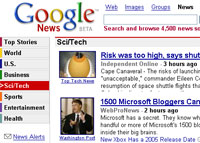 Google is busily hatching plans to dramatically improve the results of internet news searches by introducing a system that ranks articles by quality rather than just their date and relevance to search terms.
Google is busily hatching plans to dramatically improve the results of internet news searches by introducing a system that ranks articles by quality rather than just their date and relevance to search terms.
Currently, typing something like ‘Iraq’ into Google, will generate zillions of “hits”, ranked in order of relevance or by date, so that the most recent or most focused appear at the top of a monster list.
The problem with this approach is that news stories from more authoritative sources – say the CNN or the BBC – can be knocked off the first page of results because they are not as recent or as relevant to the keywords typed into the search box.
Google hopes to address this problem by building a smartypants database that will compare the track record and credibility of global news sources and adjust the ranking of any search results accordingly.
The database will do its thang by continually monitoring the number of stories from all news sources while making a note of average story length, number with bylines, the number of the news agencies cited, along with how long they have been in business.
And there’s more! Google’s database will also record the number of staff a news source employs, monitor the volume of internet traffic to its website and check its international appeal by counting the number of countries accessing the site.
A big box stuffed full of levers and blinking lights will then absorb all these parameters, weigh them according to a clever-clogs formulae it is constructing, and then distil them down to create a single value.
We like to think that this number – then used to rank the results of any news search – is noisily outputted on a long string of ticker tape, but we might be getting a bit carried away.
Google’s ambitious system was unveiled by patents filed in the US and around the world in 2003 which revealed that the same methodology could be employed to rank other search results, such as sales and services.
Campaigners and activists may not welcome this news though, as Google’s proposed system suggests that it will be harder for independent, non-mainstream news sites to appear in the top rankings.
One of the beauties of the web is that of you type in the name of the uber-corporates Nestle into Google, the Nestlé boycott campaign appears on the first page of results.
I wouldn’t like that to change.
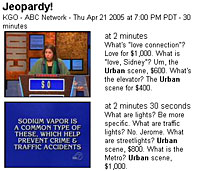 Google continues to sink its teeth into the potentially lucrative TV search business, with the announcement that it has added 14 new channels to its Google Video service.
Google continues to sink its teeth into the potentially lucrative TV search business, with the announcement that it has added 14 new channels to its Google Video service.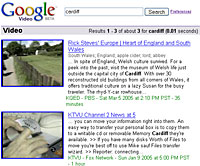 Due to unsettled licensing terms, Google cannot provide full transcripts or video clips, although their website teasingly suggests that we “stay tuned” for news.
Due to unsettled licensing terms, Google cannot provide full transcripts or video clips, although their website teasingly suggests that we “stay tuned” for news. Development of the TV indexing service is being developed at the same time as Google’s new
Development of the TV indexing service is being developed at the same time as Google’s new  The battle between Google and Yahoo continues to heat up, with Yahoo ramping up the feature set of its ‘My Web’ suite of personal search tools.
The battle between Google and Yahoo continues to heat up, with Yahoo ramping up the feature set of its ‘My Web’ suite of personal search tools. Yahoo claim that their service is “better than bookmarks”, with users able to save an exact copy of a page along with the link, so that saved content will always be there when users return to the page.
Yahoo claim that their service is “better than bookmarks”, with users able to save an exact copy of a page along with the link, so that saved content will always be there when users return to the page. Yahoo’s search history tool bears more than a passing similarity to the one released by Google last week and reflects the fierce competition between the two companies.
Yahoo’s search history tool bears more than a passing similarity to the one released by Google last week and reflects the fierce competition between the two companies.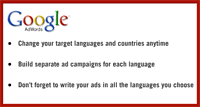 In a quest to blast their already soaring profits further up into the stratosphere, Google will test a cost-per-impression bidding model for AdWords ads, letting advertisers specify groups of sites or specific sites in Google’s ad network.
In a quest to blast their already soaring profits further up into the stratosphere, Google will test a cost-per-impression bidding model for AdWords ads, letting advertisers specify groups of sites or specific sites in Google’s ad network. Google has, however, promised limitations on the animated advertising fluff that can appear on their adverts, with blinking ads that continuously loop already declared verboten.
Google has, however, promised limitations on the animated advertising fluff that can appear on their adverts, with blinking ads that continuously loop already declared verboten. The search engine heavyweights are hoping that the approach will appeal to advertisers who are fussy about where their brand appears or are aiming for a certain niche demographic.
The search engine heavyweights are hoping that the approach will appeal to advertisers who are fussy about where their brand appears or are aiming for a certain niche demographic. Champagne corks were popping like manic machine gun fire at Google yesterday as the company reported a thumping fivefold increase in profits in the first quarter.
Champagne corks were popping like manic machine gun fire at Google yesterday as the company reported a thumping fivefold increase in profits in the first quarter. Revenues generated from Google’s partner sites through its AdSense programs generated $584 million, or 47 percent of revenues, – a hefty 75 percent increase over partner-related revenues a year ago.
Revenues generated from Google’s partner sites through its AdSense programs generated $584 million, or 47 percent of revenues, – a hefty 75 percent increase over partner-related revenues a year ago.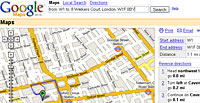 Web search goliaths Google have delivered a large size nine up the rear end of their fierce rivals Yahoo by being the first to launch a local search service in Britain.
Web search goliaths Google have delivered a large size nine up the rear end of their fierce rivals Yahoo by being the first to launch a local search service in Britain.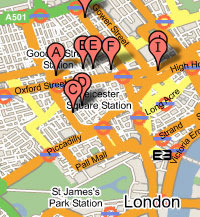 “It’s the first time we’re bringing local search to a country outside North America,” said Kate Burns, ad sales and operations manager for Google in Britain, declining to give details about launches elsewhere in Europe.
“It’s the first time we’re bringing local search to a country outside North America,” said Kate Burns, ad sales and operations manager for Google in Britain, declining to give details about launches elsewhere in Europe.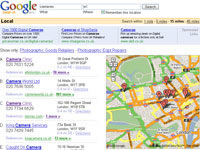 Global search advertising revenue is already sending cash tills into overdrive, with US investment bank Piper Jaffray estimating spending to rise to US$7.9 billion (£4.1BN/€6bn) in 2005 from US$5.5 billion (£4.1bn/€4.2bn) in 2004 – with most of the growth coming from international expansion and higher volume.
Global search advertising revenue is already sending cash tills into overdrive, with US investment bank Piper Jaffray estimating spending to rise to US$7.9 billion (£4.1BN/€6bn) in 2005 from US$5.5 billion (£4.1bn/€4.2bn) in 2004 – with most of the growth coming from international expansion and higher volume.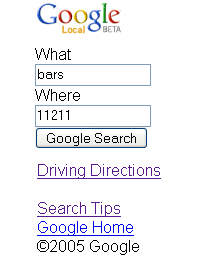 Google is making its local-search service available to mobile-toting users, offering maps and driving directions optimised for the wee screen.
Google is making its local-search service available to mobile-toting users, offering maps and driving directions optimised for the wee screen.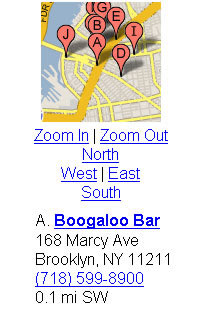 Telephone numbers are displayed as a hyperlink, and if the users’ phone supports the facility, clicking on the link will dial the listed telephone number (unlike some local search services, there is no additional charge for this).
Telephone numbers are displayed as a hyperlink, and if the users’ phone supports the facility, clicking on the link will dial the listed telephone number (unlike some local search services, there is no additional charge for this).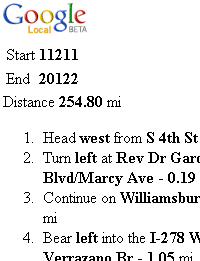 Local search services are set to be the big hot potato of 2005, with the Kelsey Group reporting that local search ad spending hit US$162 million (£85m/€125m) in 2004.
Local search services are set to be the big hot potato of 2005, with the Kelsey Group reporting that local search ad spending hit US$162 million (£85m/€125m) in 2004.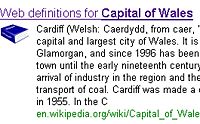 Google has started dishing out factual answers for some queries at the top of its results page, thus sparing click-weary users the hassle of navigating to other sites to look up the information.
Google has started dishing out factual answers for some queries at the top of its results page, thus sparing click-weary users the hassle of navigating to other sites to look up the information. Norvig went on to explain that Google feeds the service with information from Web sites they considers to be reliable, but it’s yet to establish formal relationships with any of the sites providing the content.
Norvig went on to explain that Google feeds the service with information from Web sites they considers to be reliable, but it’s yet to establish formal relationships with any of the sites providing the content.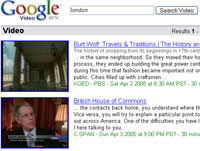 Google plans to invite users to submit personal video clips for archiving as part of its recently launched video search service.
Google plans to invite users to submit personal video clips for archiving as part of its recently launched video search service. The company also announced that it would provide data about popular Web searches to Current, a new television network for the 18- to 34-year-old audience, backed by former US Vice President Al Gore and other investors.
The company also announced that it would provide data about popular Web searches to Current, a new television network for the 18- to 34-year-old audience, backed by former US Vice President Al Gore and other investors.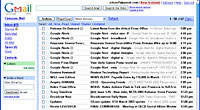 A year after its launch, Google has doubled the capacity of its Gmail service and added new features.
A year after its launch, Google has doubled the capacity of its Gmail service and added new features.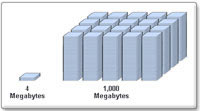 Google is, however, aware that some crafty Gmail subscribers are using the service for this purpose, mailing files to themselves as a way of storing them online.
Google is, however, aware that some crafty Gmail subscribers are using the service for this purpose, mailing files to themselves as a way of storing them online.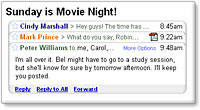 Curiously, Gmail is still technically in a beta phase, and is not generally available – the only way users can obtain a Gmail account is by invitation from an existing user (each current user has 50 invitations to give).
Curiously, Gmail is still technically in a beta phase, and is not generally available – the only way users can obtain a Gmail account is by invitation from an existing user (each current user has 50 invitations to give).